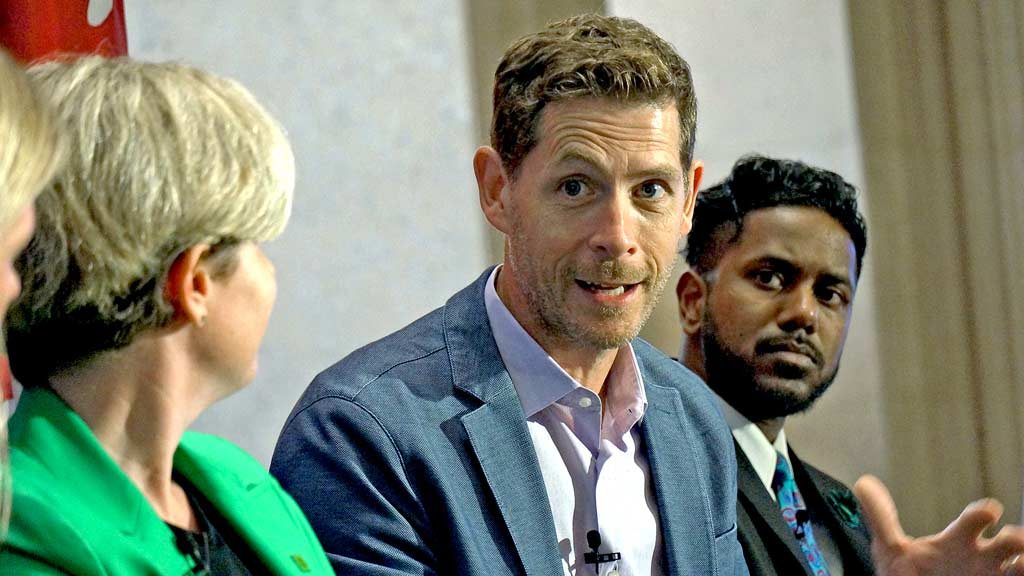The future of work — what it means, how important it is and how businesses can prepare for striking changes coming — was the topic of a panel session recently in downtown Toronto.
Describing the future of work as “central to business today,” Chris Dulny said it is “exceedingly difficult” to define what the job roles and titles of workers will be over the next five years because “they are yet unknown.”
Dulny, chief innovation officer of PwC, a global business consultant, moderated the panel session presented by the Economic Club of Canada. PwC’s annual surveys of CEOs around the world over the past decade — about the opportunities they see in their fields — have proven to be “an excellent precursor to what happens with the GDP,” he told the packed luncheon.
When CEOs are bullish, GDP rises; when they are pessimistic — as they are today, GDP falls, Dulny told the seminar.
He attributed that pessimism to “a number of reasons related to the unpredictability of the times…”
He said 88 per cent of the survey respondents said they do not have the teams in place to “take them forward.”
Panelists suggested governments and employers across Canada need to prepare for a quickly changing work world. And, leaders can’t expect to sit back and rely on post-secondary institutes to train and educate people for future work.
“I think we need to have a sense of urgency (to innovation and technology)…to creating the workforce of the future,” said Jennifer Reynolds, president and CEO, Toronto Finance International.
Reynolds said having a talented pool of workers is one of the keys to grabbing a competitive advantage in the next few years.
To draw talent, however, Canada and employers need to “take more risks and move a little more quickly” to adapt to the changing work world, she said.
Reynolds told the luncheon audience that while Canada has shown some spirit to innovate, it needs to do more.
Norie Campbell, group head, customer and colleague experience, TD Bank Group, said companies should make sure that their leaders are ready to lead change. That includes having the right tools to assess people for the right skills.
In the coming years, employers are going to almost “have to start taking bets” on where to invest in skill development, added Jonathan Lister, vice-president, global sales and solutions, LinkedIn.
Lister said Canada has an aging workforce which “is still heavily dependent” on resource-based industries. “Those are not great things for the next 50 years.”
Alberta, he said, is an example of where a shift is happening. “If you look to Calgary and the oil-patch in the last few years, things changed fast.”
LinkedIn has worked with the Ontario ministry of trade on connections around the world. “There are lots of ways to get more creative…” to understand the future workforce and what skills they will require, Lister added.
“Give employees skills not for the job today…but for their career,” he said, noting the importance of transferable skills for future work.
Lister also advised employers to seek to understand their customers and then work on solving their problems.
Also on the panel was Darius Sookram, president of the Economic Club, who said by 2025 artificial intelligence (AI) is projected to be at least a $7.2 trillion industry around the globe.
Sookram told the seminar that workers have to be committed to lifelong learning to meet the fast pace of change.
He said post-secondary institutes as well as the private sector need to look at new programming/training.
Campbell said it is paramount that young Canadians grow up with a belief that they can do any job they want.











“At work, expertise is falling out of favor” quotes a recent article in The Atlantic Daily. Minimal manning—and with it, the replacement of specialized workers with problem-solving generalists will sound familiar to anyone in an organization who’s been asked to “do more with less”. In Canada,the continuing fashion of replacing merit with diversity, Deloitte consultant Erica Volini projects, that 70 to 90 percent of workers will be in so-called hybrid jobs or superjobs—that is, positions combining tasks once performed by people in two or more traditional roles.
In essence, learn how to learn and specialize in your ability to learn not simply on spreadsheet analysis and be prepared to absorb the responsibilities of many assignments.